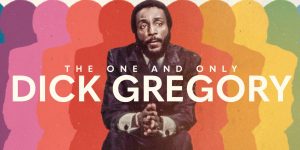“Oh man, shut your anorexic, malnutrition, tapeworm-having, overdose on Dick Gregory Bahamian diet-drinking ass up. Leave me alone!”
— Wesley Snipes to Kadeem Hardison in “White Men Can’t Jump,” written and directed by Ron Shelton.
In the early 1960s, Dick Gregory broke the mold for Black comedians. Unlike many of his predecessors, he walked onstage, sat on a stool, and told jokes about race in a way no one had before. He was so good at it he was a hit in front of both Black and white audiences, to the point where he became one of the top-earning entertainers in the country. In addition to his tour dates, he made regular appearances on TV talk shows hosted by Jack Paar, Merv Griffin, and David Frost.
Then Gregory was moved by civil rights leaders who implored him to go to Mississippi and help with voter registration drives. That meant giving up paying gigs to speak to crowds of protestors and marching with them, facing the very real danger of racist cops who not only arrested but beat him, too. At one point, he was shot, but lived to talk about it on many of those same TV shows — particularly the one hosted by Merv, who booked Gregory when others wouldn’t.
All of this is told in a new documentary, “The One And Only Dick Gregory,” which includes archival footage of its subject in action, as well as commentary from Chris Rock, Wanda Sykes, Dave Chappelle, W. Kamau Bell, Kevin Hart, and Lena Waithe (the latter two were among the executive producers of the project). The movie highlights both Gregory’s comedy and his activism, which turned to opposing the Vietnam War (making him a target of the FBI), then trying to raise awareness of world hunger in the 1970s. That cause led to him undertaking long fasts and later creating a nutrient powder he hawked incessantly as part of a “Bahamian Diet” in the 1980s.
Along the way, Gregory fathered ten children with his wife, Lillian, who was stuck at home taking care of them because he was away on the road so much. She and a few of their now-grown kids are interviewed in the movie, describing the highs and lows of his career and how their financial situation fluctuated dramatically because he didn’t seem to care about money.
The best parts of “The One And Only Dick Gregory” are those that showcase him doing what he did best, speaking into a microphone to point out the absurdities of life, prejudice, and injustice in America. In addition to a place on the St. Louis Walk Of Fame, Gregory is still revered by many of the comics who followed in his footsteps, who happily explain why he deserves their admiration.
“The One And Only Dick Gregory” serves as a good primer on one of the most influential comedians and activists of his era. I give it an 8 out of 10. Premieres Sunday night on Showtime, and will rerun throughout July.

